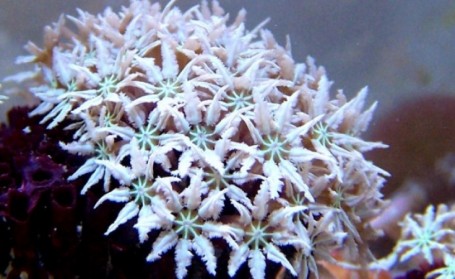- Name:
Pipe Organ Coral
- Family: Tubiporidae
- Species: Tubipora
- Scientific Name: Tubipora musica


General info about Pipe Organ Coral
In general, corals coming from the genus Tubipora has a network of calcium-based skeleton that is arranged in rows and looks like a musical instrument called Pipe Organ. Each of the tube is composed of several polyps that has 8 feather-like tentacles. Their skeleton is colored red, but is usually not seen since it is usually covered with their protruding tentacles that has another color.
As for the Pipe Organ Coral they are predominantly colored red with violet tentacles. This are the water parameters for cultivating Pipe Organ Coral:
- Calcium: 420 - 430 ppm
- Alkalinity: 3.21 - 3.57 MEQ/L (9 - 10 dKH)
- Phosphates: 0
- Magnesium: 1280 - 1350
- Strontium: 8 -10 mg/L
- Temperature: 77° - 81° F (25° - 27° C)
- Salinity / Specific Gravity: 1.023 - 1.025
- pH: 8.0 - 8.4
Pipe Organ Coral Diet & Nutrition
While the Pipe Organ Coral gets it primary nourishment from a symbiotic zooxanthellae living within its tissues, the require supplemental feeding like mysis or brine shrimp.
Fragging / Propagating Pipe Organ Coral
The Pipe Organ Coral should be set either at the bottom or at the middle part of the tank.
Flow / Lighting Requirements for Pipe Organ Coral
The Pipe Organ Coral requires moderate lighting and moderate waterflow.
Pipe Organ Coral Origin
The Pipe Organ Coral are found in the waters of the Indo-Pacific Ocean.
Caution Should be Taken with Pipe Organ Coral
While the Pipe Organ Coral has a peaceful behavior, you have to give them enough space since they release a slime coat that is harmful to other corals and irritating to a human skin. You should wear gloves in handling them. They don't need too much light, otherwise they will die and will be eaten by both fish and invertebrates.
How to Acclimate Pipe Organ Coral
Pipe Organ Coral are purely marine species. Therefore, salinity must be entirely maintained from 1.023 to 1.025 specific gravity.
Stinging Tentacles on Pipe Organ Coral
Pipe Organ Coral occassionaly releases a slime coat from their body that is harmful when lodged to other coral colonies. This slime coat can cause irritation to the human skin, so you should wear gloves in handling them.
Original Detail
| Name | Species | Family | Scientific Name | More Detail | Added by |
|---|---|---|---|---|---|
| Pipe Organ Coral | Tubipora | Tubiporidae | Tubipora musica | In general, corals coming from the genus Tubipora has a network of calcium-based skeleton that is arranged in rows and looks like a musical instrument called Pipe Organ. Each of the tube is composed of several polyps that has 8 feather-like tentacles. Their skeleton is colored red, but is usually not seen since it is usually covered with their protruding tentacles that has another color. As for the Pipe Organ Coral they are predominantly colored red with violet tentacles. This are the water parameters for cultivating Pipe Organ Coral:
|
PalaciosAn |
Changed by users
| Submitted Date | Submitted By | Status | Action |
|---|---|---|---|
| 2019-01-18 10:03:31 | Tristan Paylado | Approved |




